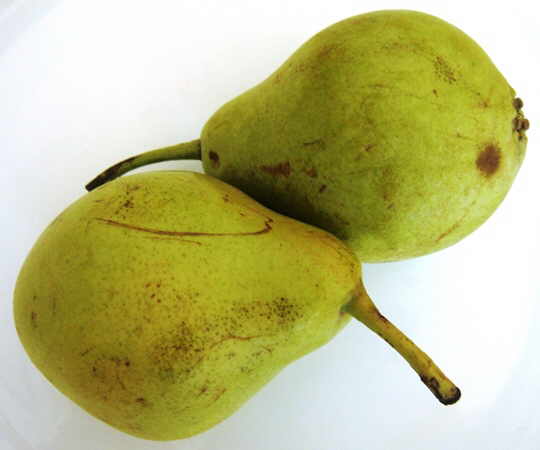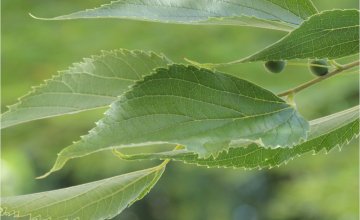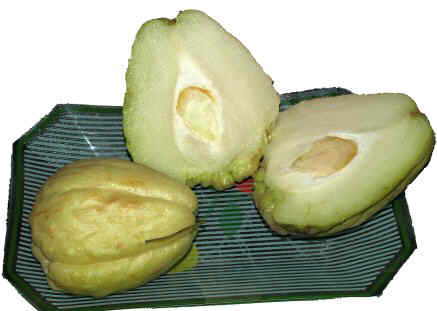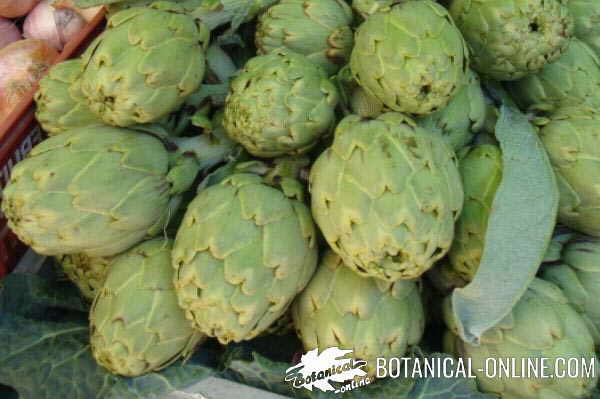Contents
- 1 NATURAL TREATMENT FOR IRRITABLE COLON
- 1.1 Phytotherapy: medicinal plants for irritable colon
- 1.2 HERBAL TEAS FOR IRRITABLE BOWEL
- 1.3 Plants to reduce irritable bowel pain
- 1.4 Medicinal plants to stop diarrhea in irritable bowel
- 1.5 Laxative plants and supplements for constipation in irritable bowel
- 1.6 MEDICINAL PLANTS THAT ARE NOT RECOMMENDED FOR CONSTIPATION
- 1.7 OTHER NATURAL REMEDIES FOR IRRITABLE BOWEL
- 1.8 Probiotics for the irritable bowel
- 1.9 Supplements for irritable bowel
NATURAL TREATMENT FOR IRRITABLE COLON
Phytotherapy: medicinal plants for irritable colon

Some medicinal plants used in the natural treatment of irritable bowel
The herbal medicine in irritable bowel syndrome involves the use of a series of preparations made with plants with the following aims:
- Plants to reduce pain.
- Plants to prevent the spasms.
- Plants for anxiety or stress.
- Plants for diarrhea.
- Plants for constipation.
Parallel to medical treatment and herbal medicine, it is important that some type of relaxation therapy be done to reduce stress, treat insomnia and other nervous symptoms that may appear. Practicing sports or other relaxing activities is an option.
The doctor may recommend some medications for irritable bowel that may be incompatible with some supplements, so it is recommended to consult with the doctor the adequacy of each treatment.
HERBAL TEAS FOR IRRITABLE BOWEL
The main plants for the irritable bowel syndrome include the following:
Plants to reduce irritable bowel pain
Carminative, antispasmodic, analgesic and sedative plants, with essential oils with properties that can alleviate the pain produced by irritable bowel and intestinal spasms:
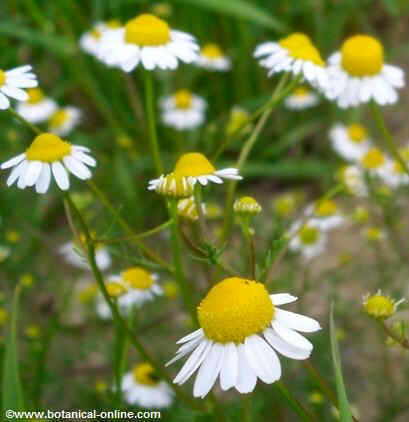
Chamomile is a very useful plant to treat irritable bowel
- Chamomile (Matricaria officinalis): Chamomile has carminative, sedative, antispasmodic and antiemetic properties, well suited to reduce gas and spasms and pain that affect people suffering from irritable bowel syndrome. (Infusion of a spoonful of dried flowers per cup of water. Take 2 to 3 cups per day)
- Mint (Mentha piperita): This plant has been shown beneficial in the treatment of irritable bowel with diarrhea and is one of the most recommended. The carminative and relaxing properties of this plant can help to improve the symptoms of this disorder. (Infusion of mint, a couple of glasses a day) (Take capsules of peppermint oil specifically made for the intestine sold in pharmacies or specialty stores)
- Thyme: (Thymus vulgaris): It favors digestion, it avoids the gastric and intestinal spasms and prevents the formation of gas and putrid retentions in the intestines. (Infusion of a teaspoon of flowering pots per water cup. Take 3 cups a day after meals)
- Garlic oil (Allium sativum): The ingestion of capsules of garlic extract or garlic oil helps to eliminate pathogenic bacteria that cause many diarrhea. It may also be suitable in constipation to help improve the intestinal flora and eliminate pathogenic bacteria (Garlic extract or garlic oil according to the package leaflet) (Eat crushed raw garlic, if tolerated)
- Lemon balm: (Melissa officinalis): Its antispasmodic function is not only limited to the level of musculature of the external members. Internally, the sedative properties of this plant may be useful to relieve spasms of the digestive system by acting on the musculature of their bodies (one tablespoon per infusion glass of water over 15 minutes. 3 or 4 glasses a day between meals)
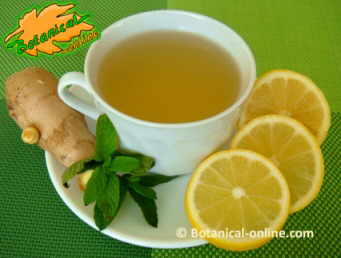
Infusion of ginger and mint for irritable colon
- Ginger (Zingiber officinalis): (Infusion of ginger twice a day)
- Rice (Oryza sativa): Enriched rice drink is a healthy way to eat calcium for people suffering from digestive diseases. Rice water is a preparation that feels good, especially in cases of diarrhea.
- Marshmallow (Althaea officinalis): It exerts a regulating function of the intestine that can be used for the treatment of both diarrhea and constipation. The tannins would intervene in the first situation and the mucilages in the second.
* Treatment for diarrhea: 15 ml tincture per day divided into 3 doses – sold in pharmacies and herbalists
* Treatment for constipation: Infusion of a small spoonful of flowers and dried leaves per cup of water for 10 minutes, two cups a day)
- Valerian (Valeriana officinalis): It can be used to diminish the spasms and to reduce pain, anxiety, vomits, bloating, or stress. (Infusion of about 15 grams of the root of the plant that is let to rest overnight)
Medicinal plants to stop diarrhea in irritable bowel
They are astringent plants, such as
- Sage (Salvia officinalis): Its antidiarrheal or astringent properties, combined with its sedative and antiemetic values, can help combat diarrhea and cramping or vomiting that are common in people with this disorder. (Three cups spread throughout the day with the infusion of 15 gr. of leaves per liter of water)
- Plantain: (Plantago ssp.): Because its tannin wealth, it has astringent properties, suitable to stop diarrhea (infusion of one teaspoon of dried leaves per cup of water. Take three cups daily) The seeds of psyllium (Plantago psyllium) can be used for the same purpose.
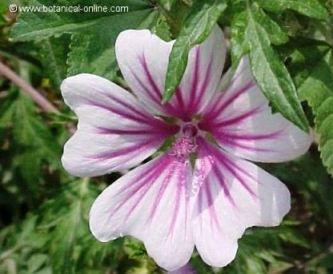
Mallow flower
- Mallow (Malva sylvestris): Infusion of 1 small flower per cup for 10 minutes. Two cups a day)
- Purple loosestrife (Lythrum salicaria): Pectin and tannins confer anti-diarrheal and astringent properties. (Infusion of a spoonful of dried flower tops per glass of water Take a small cup after each meal)
- Bilberry: (Vaccinium spp. ): Its astringent properties are able to stop the excess stool. Blueberries can be eaten raw or in a “tincture with fruits of blueberries”. To prepare it, macerate 40 g of dried fruit in 360 g of alcohol at 70 º for 10 days. Once we have the tincture, take about 25 drops mixed in a glass of water twice daily until the rebel diarrhea is resolved.
- Garcinia (Garcinia cambogia): Traditionally used for irritable bowel.
* See other suitable plants for diarrhea.
Laxative plants and supplements for constipation in irritable bowel
In the treatment of constipation produced by irritable bowel syndrome, one should not use too aggressive laxative plants such as cassia (Cassia angustifolia), rhubarb (Rheum sp.), Sacred bark (Rhamnus purshiana) or alder buckthorn (Rhamnus frangula) that can lead to a worsening of the symptoms. These will only be used if the doctor considers it necessary. Instead we will take those who have a mild laxative effect, such as:
- Marshmallow (Althaea officinalis): It exerts a regulating function of the intestine that can be used for the treatment of diarrhea and constipation. Tannins intervene in the former situation and mucilage in the second. (For diarrhea: 15 ml dye per day split into 3 doses – available in pharmacies and herbalists. For constipation: infusion of one teaspoon of dried flowers and leaves per cup of water for 10 minutes. Two cups a day)
- Dandelion (Taraxacum officinale): It has very mild laxative properties. (5 g of fluid extract a day)
- Flaxseeds (Linum ussitatissimum): the seeds of flax or flaxseed are rich in mucilages. (As a preventative, take at breakfast one tablespoon of flaxseed put to soak in a glass of water the night before. Drink all the liquid. To increase the effect, you can add a couple of prunes to the preparation and also take it at breakfast) (If you want to use it as a laxative, you must double the dose, taking the preparation twice a day) (A simple way to prevent constipation is also to add a tablespoon of raw seeds in soups, yogurt, etc)
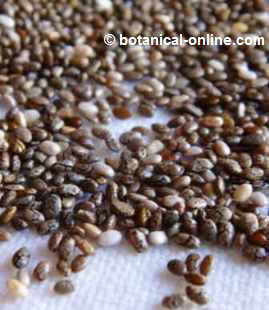
Ground chia seeds are very good to regulate intestinal transit
- Ground chia seeds: (Salvia hispanica): The effect of mucilage fiber is beneficial for the intestinal wall and also helps regulate intestinal transit. (1 tablespoon of chia in 1 glass of water)
- Psyllium seed husks or ispagol (Plantago ovata): Reduces the negative symptoms of irritable bowel, improving patient conditions and avoiding episodes of diarrhea or constipation. (100 to 300 dg of seed husk, divided into two or three times a day)
MEDICINAL PLANTS THAT ARE NOT RECOMMENDED FOR CONSTIPATION
There are some aggressive remedies that are often used erroneously for constipation which are not suitable. We refer to the following plant remedies:
- Wheat bran, oat bran or corn fibers: Its insoluble fiber content is very irritating to the intestine. In addition, its supplementation is capable of producing intestinal blockage.
- Laxative infusions: The majority of laxative infusions that can be found contain very potent plants with great contraindications such as cassia (Cassia angustifolia), rhubarb (Rheum sp.), Cascara sagrada (Rhamnus purshiana) or alder buckthorn (Rhamnus frangula). Its frequent use makes the syndrome worse.
In some cases, specialists consider that the habitual use of laxative infusions is what produces chronic constipation and that can trigger this syndrome. (more information)
OTHER NATURAL REMEDIES FOR IRRITABLE BOWEL
Probiotics for the irritable bowel
Probiotics have had positive results in the treatment of irritable bowel syndrome in reducing their symptoms.
In the irritable bowel certain strains are recommended, which have been shown to be beneficial for these cases in different studies. They are the following: Bifidobacterium infantis, Lactobacillus acidophilus, L. rhamnosus, L. lactis, B. longum, B. coagulans.
Supplements for irritable bowel
The supplements to improve diarrhea in irritable colon consists of supplements of plants, vitamins or minerals to supply possible deficits …
Related information:
– Supplements for irritable bowel
– Diet for irritable bowel with diarrhea
– Diet for irritable bowel with constipation
– Prohibited food for irritable bowel
– Recommended food list for irritable bowel
![]() More information on irritable bowel syndrome.
More information on irritable bowel syndrome.




